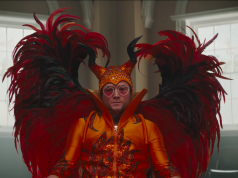While it’s not wise to be slavishly devoted to your source material when making a movie out of a book or play, it’s worth noting that most of what’s wrong with the film version of “Rent” is because they made unnecessary changes.
Here’s an easy one to get us started: While the play is set in the present (i.e., 1996, when it premiered), the movie is set in 1989. There are cultural reasons why this is a mistake that I’ll get into later, but for now I’ll just say that if you’re going to set your film in 1989, you’d probably better take out the reference to “Thelma & Louise,” which didn’t come out until 1991. I’m just sayin’.
The film version of Jonathan Larson’s Tony- and Pulitzer Prize-winning rock musical, which opened on Broadway in April 1996 and is still running, has been years in the making. With each passing year, the film has become less and less of a good idea. What felt revolutionary in 1996 now feels square, even precious. The rockin’ parts of the score sound dated. Most of the original cast members reprise their roles for the film, and while you could sympathize with the characters when they were 25-year-old bohemians trying to find themselves, it’s hard to extend such compassion to people being played by 35-year-old actors. Standing on a table at an all-night cafe and singing about how The Man won’t get you down is cute when you’re just out of college. When you look 35, you need to stop whining and get a job.
The story is loosely based on the opera “La Boheme” and tells of a cluster of underemployed artist types in New York’s East Village. Mark (Anthony Rapp), our vaguely asexual narrator, wants to make films. His best friend Roger (Adam Pascal) is a singer/songwriter who has been in a funk for a year, since finding out his girlfriend gave him AIDS. (Whoops.) Their pal Collins (Jesse L. Martin) is gay and also HIV-positive; at the film’s beginning, he meets Angel (Wilson Jermaine Heredia), a drag queen who, yep, has AIDS too.
The women in their circle are lesbians, though one of them, Maureen (Idina Menzel), used to date Mark. Now she’s partnered with the uptight Joanne (Tracie Thoms), who is nervous about Maureen’s flirtatious, wanton ways.
Beginning on Christmas Eve and eventually spanning a year, the story covers the group’s lives and loves, particularly Roger’s stormy relationship with Mimi (Rosario Dawson), a nightclub dancer who lives downstairs, is addicted to heroin, and hey, why not, has AIDS.
I don’t remember finding it funny, when I saw the stage version of “Rent,” that nearly every character has AIDS. Yet the film makes it seem so contrived, so artificial. In fact, of the major characters, only Mark and perhaps Joanne ever feel exactly “real.” (Their song about Maureen’s treacherous ways is a high point.) Roger sings all his songs with a growly rock ‘n’ roll voice, yet his facial expression seldom matches it; Angel is a caricature; their enemy Benny (Taye Diggs), a former slacker who now has money and property, is a cartoon; everyone else is a two-dimensional stereotype. When Maureen does her big “performance art” protest concert, she looks like every other neo-hippie liberal-arts graduate you ever met.
Now let us examine the music. The stage version is almost entirely sung. When a song begins only 10 seconds after the last one ended, it flows smoothly because the space between them is filled with underscore or semi-sung dialogue. The effect is that the whole piece feels unified and connected.
The film, however, replaces nearly all of the between-songs singing with music-free dialogue. A song ends, 10 seconds pass, and an entirely different song starts. The unintended effect? Laughter. (“Another song already?! Didn’t we just HAVE one?!”) It feels not like a story but like a concert: Here’s a song about this; here’s a different song about something else; now here’s a third song on yet another topic.
The film’s most curious misstep is moving the story to 1989-90. Why not set it in 1996, when it was written, and when it was intended to be set? America changed a lot between 1989 and 1996, just as it has changed a lot between 1996 and 2005. AIDS had been on the scene only a few years in 1989; by 1996, it was much more likely that you’d have so many people in a small group afflicted with it, and that the community around them would be so understanding and supportive. It’s also unlikely (to the point of being preposterous) that in 1989 a well-to-do conservative couple like Joanne’s parents would have thrown their lesbian daughter a commitment-ceremony party at their swanky country club. (The play has no such scene, and in fact has Joanne’s father telling her to come to an upcoming event “alone,” i.e., without Maureen. Why the film would move the timeline BACKWARDS yet move characters’ attitudes FORWARD is beyond me.)
The thing about idealistic young rebels is that they usually wind up turning into regular citizens as they age. The hippies get jobs and buy houses, the revolutionaries become part of the Establishment, the people who once hated The Man become The Man themselves. And “Rent,” which wanted to fight the power and give voice to a new generation in 1996, is now one of the longest-running shows on Broadway — the most conservative, non-radical district in all of theater — and has its own capitalist cottage industry behind it. The show that wanted to be different now feels as quaint as “The Sound of Music.”
Furthermore, the film is directed generically by Chris Columbus, whose career is the very definition of safe, unassuming filmmaking (“Mrs. Doubtfire,” “Stepmom,” the first two Harry Potter films). Watching it, you get the sense that not a single person involved has any remembrance of what it’s like to be a penniless, starving artist, if indeed they ever knew. Jonathan Larson wrote “Rent” from a passion he had, because he burned with ideas he wanted to express. (He died, not of AIDS, weeks before the show opened.) The movie was made for exactly the opposite reason: Someone thought it would be a cash cow. The characters in the play who fret over the prospect of “selling out”? Imagine how they’d feel if they’d written a groundbreaking musical that got turned into a mediocre Hollywood movie.
C (2 hrs., 15 min.; )





